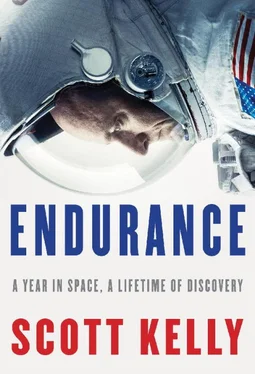After we say our good nights, I slide into my bag, turn off the light, and try to fall asleep. As of tomorrow, Kjell, Kimiya, and Oleg will have spent one hundred days in space. Kjell and I will have some time to recover before preparing for our second spacewalk. That one will be even more complicated and physically demanding. But for now, I can rest. One of the biggest hurdles of this year is now behind me.
—
I CALL my father one evening to see how he’s doing, and he tells me that my uncle Dan, my mother’s brother, has died. He had suffered from a debilitating skeletal condition for most of his life, so his death was not a huge surprise, but because he was only ten years older than me he still seems too young to be gone. When Mark and I were about ten, Uncle Dan had moved into my family’s basement for a while, and because he was closer to our age than to my mother’s, I remember him being more like a big brother than an uncle. I remark to my father that death doesn’t wait while I’m in space, any more than life does. The fact that I never said good-bye and won’t be back until long after the funeral is a reminder that I’m missing things that can never be made up.
A few days later, I stop Kjell when he is floating through the U.S. lab and ask him if he could spare a minute. I put on a serious face and tell him I need to talk with him.
“Sure, what’s up?” Kjell responds with his characteristic upbeat tone. People who are this sunny and positive can come across as fake, but I’ve learned from working with Kjell all this time in close quarters and under challenging circumstances that his attitude is completely real. He actually is that positive. I imagine this trait served him well as an emergency room doctor, and it’s equally valuable in long-duration spaceflight.
“It’s about the next spacewalk,” I say, with a serious tone. I pause as if I’m searching for the right words.
“Yeah?” Kjell says, now with a hint of apprehension.
“I’m afraid I have to tell you—you’re not going to be EV Two.” EV2 was the role Kjell had played on our first spacewalk—I was the leader (EV1) as the more experienced astronaut, though it was the first time outside for both of us.
A look of concern crosses Kjell’s face, followed quickly by sincere disappointment.
“Okay,” he answers, waiting to hear more.
I decide I’ve fucked with him enough. “Kjell, you’re going to be EV One.”
It was a mean trick, but it’s worth it to see the relief and excitement on his face when he realizes that he has been promoted. Kjell will fly more future missions and likely will conduct more future spacewalks, so it will be invaluable for him to get experience as the leader. I have full confidence in his ability to carry out this role, and I tell him so. We have a lot of preparation to do.
—
NOVEMBER 3 IS a midterm election day on Earth, so I call the voting commission in my home county—Harris County, Texas—and get a password that I can use to open a PDF they emailed to me earlier; I fill out my ballot and email it back to them. There are no political candidates on the ballot, just referendums. Still, I take pride in exercising my constitutional rights from space, and I hope it sends a message that voting is important (and that inconvenience is never a good excuse for failing to vote).
I follow the news from space, especially political news, and it seems like the presidential election next year is going to be like no other. Like the hurricanes I watch from above, a storm seems to be gathering on the horizon that will shape our political landscape for years to come. I pay close attention to the primaries of both parties, and though I don’t tend to be a worrier, I start to worry. Sometimes before going to sleep I look out the windows of the Cupola at the planet below. What the hell is going on down there? I mutter to myself. But I have to concentrate on the things I can control, and those are up here.
16

THE RUSSIANS HAVE a very different system for medically certifying people to fly, and when we travel in their Soyuz we must abide by their rules. So it was a problem when my new flight surgeon Steve Gilmore presented me as a crew member to fly on the Soyuz to the International Space Station after having recently been treated for cancer.
Russian surgical procedures and treatment options for prostate cancer are not as advanced as those in the United States, and as a result, their statistics on survival and recovery are very different. Russian doctors overestimated the chances that I would experience debilitating negative effects from the surgery or have an early recurrence of the cancer. They were especially concerned that I would suddenly find myself unable to urinate in flight, which would require a costly and dramatic early departure. They didn’t want to take that risk.
Steve worked hard to convince the Russian doctors that my surgery had been a success and that I was going to be able to pee just fine in space. We called Steve “Doogie,” because of his youthful appearance, or “Happy,” for his cheerful disposition. He worked on this issue for more than a year. It would have been easier for NASA to simply replace me with someone else, and I’m grateful they stood by me. In the end, the Russians agreed to let me fly, recognizing that our expertise and experience in this area were superior to theirs. They still made me fly with a catheterization kit in the Soyuz.
I began training for my mission to the space station in late 2007, with the launch scheduled for October 2010. Missions to ISS were divided into expeditions of six crew members, and my time on station would cover both Expeditions 25 and 26. In 2008, I began working with Sasha Kaleri, the Soyuz commander, and Oleg Skripochka, who would fly in the left seat as the flight engineer. Sasha is a quiet and serious guy with a full head of dark hair speckled gray. He was one of the most experienced cosmonauts, having flown three long-duration missions on Mir and one on the ISS—608 days altogether. He also brought a lot of old-school attitude and tradition, including some small Soviet flags, as part of his kit of personal items we get to launch in the Soyuz. He seems to be nostalgic for the Communist system, which of course was odd to me, but I liked him nonetheless. Oleg was on his first spaceflight. Studious and well prepared, he tried to model himself after Sasha in every way, and in turn Sasha treated Oleg like a son or a little brother.
This wasn’t my first time training with the Russians, of course; I had trained to fly as the backup for Expedition 5 in 2001 and again as part of the backup crew for the flight prior to this one. By now, I was intimately familiar with the way the Russian space agency handles training similarly to NASA, such as an emphasis on simulator training, and the way they don’t, like their emphasis on the theoretical versus the practical—to an extreme. If NASA were to train an astronaut how to mail a package, they would take a box, put an object in the box, show you the route to the post office, and send you on your way with postage. The Russians would start in the forest with a discussion on the species of tree used to create the pulp that will make up the box, then go into excruciating detail on the history of box making. Eventually you would get to the relevant information about how the package is actually mailed, if you didn’t fall asleep first. It seems to me this is part of their system of culpability—everyone involved in training needs to certify that the crew was taught everything they could possibly need to know. If anything should go wrong, it must then be the crew’s fault.
Читать дальше













